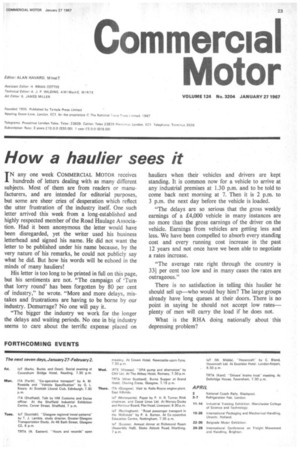How a haulier sees it
Page 25

If you've noticed an error in this article please click here to report it so we can fix it.
IN any one week COMMERCIAL MOTOR receives hundreds of letters dealing with as many different subjects. Most of them are from readers or manufacturers, and are intended for editorial purposes, but some are sheer cries of desperation which reflect the utter frustration of the industry itself. One such letter arrived this week from a long-established and highly respected member of the Road Haulage Association. Had it been anonymous the letter would have been disregarded, yet the writer used his business letterhead and signed his name. He did not want the letter to be published under his name because, by the very nature of his remarks, he could not publicly say what he did. But how his words will be echoed in the minds of many hauliers!
His letter is too long to be printed in full on this page, but his sentiments are not. "The campaign of 'Turn that lorry round' has been forgotten by 80 per cent of industry," he wrote. "More and more delays, mistakes and frustrations are having to be borne by our industry. Demurrage? No one will pay it.
"The bigger the industry we work for the longer the delays and waiting periods. No one in big industry seems to care about the terrific expense placed on hauliers when their vehicles and drivers are kept standing. It is common now for a vehicle to arrive at any industrial premises at 1.30 p.m. and to be told to come back next morning at 7. Then it is 2 p.m. to 3 p.m. the next day before the vehicle is loaded.
"The delays are so serious that the gross weekly earnings of a £4,000 vehicle in many instances are no more than the gross earnings of the driver on the vehicle. Earnings from vehicles are getting less and less. We have been compelled to absorb every standing cost and every running cost increase in the past 12 years and not once have we been able to negotiate a rates increase.
"The average rate right through the country is 331 per cent too low and in many cases the rates are outrageous."
There is no satisfaction in telling this haulier he should sell up—who would buy him? The large groups already have long queues at their doors. There is no point in saying he should not accept low rates— plenty of men will carry the load if he does not.
What is the RI-IA doing nationally about this depressing problem?












































































































